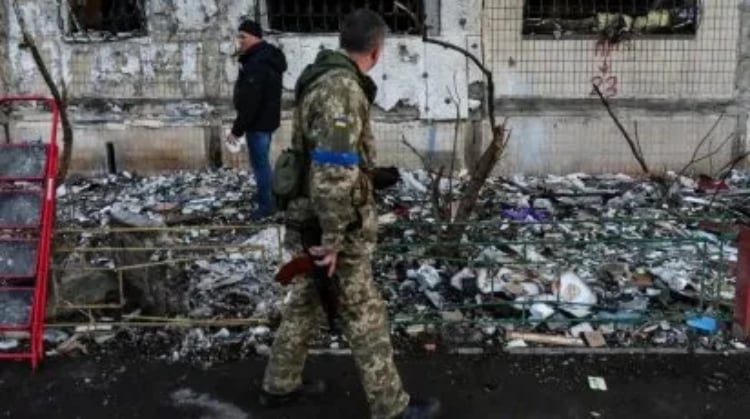The Diplomat
Spain views EU training missions for the Ukrainian army, such as the one to be discussed today and tomorrow at the Council of Foreign Affairs Ministers meeting in Prague (Czech Republic), “very favourably”, according to the Minister of Foreign Affairs, José Manuel Albares, who spoke from Santander yesterday.
Albares, who inaugurated a course at the Menéndez Pelayo International University (UIMP) on Spain’s presidency of the Council of the EU in the second half of 2023, said later, in response to questions from journalists, that Spain is “totally open to providing the necessary support from the first moment to protect Ukrainian civilians who are suffering “totally unjust and unjustified” bombardment.
He added that it is also willing to help Volodymir Zelenski’s government to defend its sovereignty and territorial integrity, and that, therefore, “plans such as training missions by the European Union or providing this support for the defence of Ukraine and its defenceless civilians are, of course, very much welcomed by Spain”.
However, the minister did not want to give too many details of the position he will present today to his counterparts from the other Member States, and added that he does not like to talk publicly about military issues in relation to Ukraine, since, in his opinion, if we really want to help Ukraine to defend its freedom, territorial integrity and sovereignty, “the fewer details are given about the type of preparation or material, the better”.
On the possibility of banning Russian citizens from entering the EU, another of the issues to be discussed at the meeting of ministers in Prague, he limited himself to saying that “Spain will support anything that helps to limit Russia’s war effort and for peace to return to Ukraine and Europe as soon as possible”.
Furthermore, the minister considered it “important” for Russian citizens to have access to free and truthful information and to be exposed to the “reality of what is happening in Ukraine”.
Furthermore, in his speech on Spain’s European Presidency, Albares pointed out that one of the “challenges” it will face will be to maintain the “unity” of the Member States in supporting Ukraine.
The minister insisted that the war in Ukraine is more “long-term” and, therefore, its consequences will also have to be faced during Spain’s Presidency of the EU. He indicated that this meeting comes at a “fundamental” time and, for this reason, Spaniards are called upon “once again to give the best of themselves in a very complex and convulsive European context” in which, in his opinion, “Spanish pro-European leadership is necessary” in order to “protect Europe and ensure that it continues to be a Europe that protects”.
In Albares’ opinion, the EU in 2023 will face the “greatest challenge of all”, which will be to maintain “the social pact” with citizens, to “leave no one behind” and “protect the Europe that protects”, and to do so in a “complex economic context, much more than ever”.
The minister explained that the “climate challenge” will also have to be faced, and Spain will try to “promote” a reform of the European energy system during its Presidency that guarantees the autonomy of Europeans and reduces the current deficiencies and vulnerabilities” in this field.
In this respect, he pointed out that the MidCat gas pipeline to connect France and Spain plays a “fundamental role”, as does the possible connection between Barcelona and Livorno (Italy).
Spain will also try to give expression to its “double soul: European and Latin American” and for Spain to look towards Latin America, one of the regions which, along with the Mediterranean, will be considered “priorities” by the EU Presidency.
Albares stressed that the Spanish Presidency of the EU takes on even “more importance” as it will be the last full Presidency before the European elections in May 2024, and therefore before a new majority is formed in the European Parliament, a new European Commission and a new legislature begins with a new work plan.
This circumstance, he said, leaves “more responsibility on the shoulders” of Spain, which during the Presidency will have to “close many of the legislative dossiers that are still pending” on issues such as the climate crisis, migration and asylum, the reform of EU tax rules, a task in which Spain will not be alone but in which it will have to “lead, arbitrate and provide the necessary political impetus”.
“The Presidency is a bit like being the boss of the train station, you don’t control the locomotive, you don’t drive the train, but you do decide when it is necessary to change the points on which the train is going to run”, he pointed out in the form of a metaphor.
Furthermore, the Spanish Presidency will also have to think about the institutional future of an EU that “opens its doors” to Ukraine and Moldova, and which has “finally” unblocked the accession negotiations with North Macedonia and Albania.







